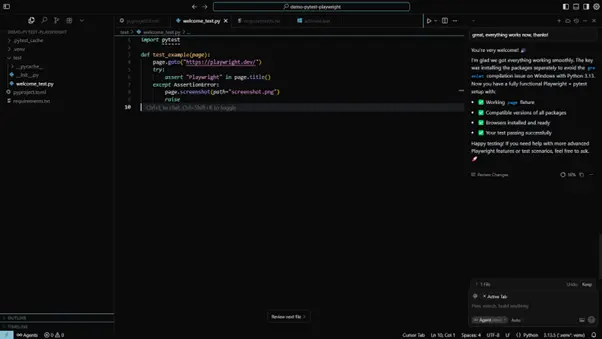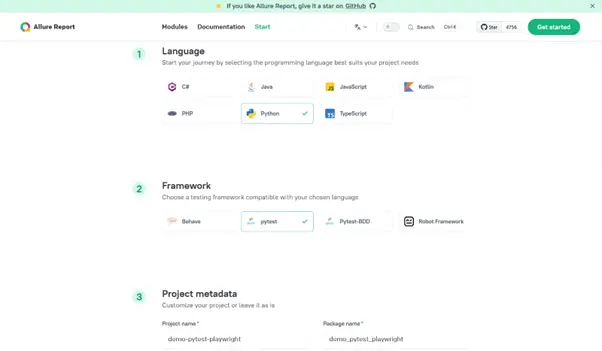The diversity of modern testing and development tools forces us to experiment a lot with the tech stack.
Suppose our team created a JavaScript project with tests, and then developers decided to switch to Python. Now, testers are presented with a choice: continue writing E2E tests in Playwright-JS, or switch to Pytest + Playwright.
Taking the time to properly analyze a decision is never easy, because it means you have to stop working. The more tests you have, the more difficult and time-consuming the analysis becomes.
What is the comparative performance of your test suite with different frameworks? How difficult will it be to implement screenshot highlighting with our new stack? Each comparison means you need to spend at least several hours on environment setup. At best, you lose a lot of time, at worst, you delay decisions and accrue technical debt.
This is an issue that the Allure team has been facing a lot, since creating a language-agnostic reporter meant working with lots of different tech stacks. To simplify environment setup, the team wrote Allure Start, an open-source tool that allows you to customize a tech stack with a few mouse clicks and then download a fully configured project environment.
To get a feel for how much time this saves, let’s go through the steps of setting up an environment for a project with Pytest and Playwright (say, for experimenting with screenshots for automated tests). First, we’ll take the usual route, and then see how Allure Start changes the process.
The usual route
We assume that Python is already installed on the system, Allure Report is available, and an IDE is configured (let’s say, Cursor). It’s probably a good idea to make sure everything is working (run `python -–version’, ‘pip –version’, and ‘allure –version’ in the terminal).
Next, we follow these steps:
- We create a new project in Cursor, add a test folder for tests, and a pyproject.toml file for metadata.
- Create a local Python virtual environment, so that we don’t pollute the common Python with our project’s dependencies: `python -m venv .venv`.
- Activate the environment: `. ./.venv/bin/activate` (Windows/Linux) or `./.venv/Scripts/Activate.ps1` (Windows).
- Update pip dependencies: `python -m pip install –upgrade pip setuptools wheel`.
- Use pip to install dependencies: ‘pip install pytest pytest-playwright allure-pytest allure-python-commons’. This will create a requirements.txt file that lists all dependencies; once it’s created, installing dependencies can be done via `pip install -r ./requirements.txt`.
- Playwright is going to need browsers to work: `playwright install`.
- It’s a good idea to freeze pip dependencies, so that future updates of Pytest or Playwright do not break our code: `pip freeze ./requirements.txt`
If everything has been hooked up properly, we can finally start writing our tests, and run them with the `pytest` command:

The usual route: switching package managers
As our experiment evolves, we might decide to switch to a different package manager — in more serious projects, poetry is usually used instead of pip. Installing and configuring poetry can take a while as well. For instance, do you remember off-hand how to configure it to use an in-project virtual environment? ChatGPT (or Cursor) does speed up this process, but it still takes a while. Keep in mind that what we’ve just described is the best case scenario, with no time spent on debugging — which is a very optimistic assumption.
The same with Allure Start
The entire process from the previous section is replaced by literally a few mouse clicks. We go to https://allurereport.org/start/, and select Python -> Pytest.

Next, we specify project metadata and download an archive that can be immediately opened in your favorite IDE. Playwright will need to be added separately, but everything else is ready. Importantly, the environment is stable and debugged.
Note that the project you’ve just downloaded contains some elements that are absent in the manual project we’ve set up above:
- An src folder with a placeholder for our system under test.
- Two scripts: run.bat for Windows and run.sh for Linux/Mac. These pretty much repeat all the steps we’ve done manually (creating a virtual environment, updating the package manager, etc.)
Now, for the second case we’ve discussed above: switching from pip to poetry. Allure Start allows us to change the package manager with literally one click:

Now download a new project, and if the old project already has some code, copy it. That’s it.
Use cases
Allure Start saves time on virtually every project, but some use cases stand out in particular.
1.Experimentation and decision-making.
That’s an obvious one, we’ve discussed it at the start. If you want to compare different frameworks, each comparison means an extra few hours setting up the environment; Allure Start cuts that time down drastically.
2. Tech Support
When someone comes to you complaining that in their setup, Jest version something.something glitches out, you need to replicate their stack if you want to reproduce their problem. Even if you’ve already worked under that exact setup, it will take you a few hours to refresh all the dependencies and ensure everything works properly.
3. Onboarding and education.
Switching to a new tech stack becomes a much easier affair if the environment is stable and debugged. This is important both for new hires, for teams that want to switch instruments, and for people new to the industry. Having just learned how to write selectors, you might be eager to get some testing done. But then it turns out you need to spend several frustrating days setting up the IDE and all the dependencies. Not fun.
Conclusion
The modern testing tech stack is incredibly variable, and you can find all kinds of permutations out there. That limits the number of people in the community who have worked on a particular permutation, makes problem-solving more difficult, and complicates experimenting with new tools.
Allure Start helps you try out different combinations of tools error-free and quickly, with just a few clicks. That means:
- Less time spent on decisions to adopt or upgrade technologies
- Way quicker diagnosing of technical problems on uncommon tech stacks
- Lower barrier of entry for people who are just beginning to learn test automation
Try it and tell us what you think!
Author

Dmitry Baev
Author of Allure Framework & CTO of Qameta Software
Allure Report are event sponsors in this years’ AutomationSTAR Conference EXPO. Join us in Amsterdam 10-11 November 2025.